#visit macedonia
Explore tagged Tumblr posts
Note
This might be very different from what you usually answer here but have you ever been to Pella?!
I can answer this one quickly....
Yes, I have!
The first time was in 1997, before the new museum was built. Most recent was 2018. Hope to get back there if not this summer then next. Btw, the new Pella Archaeological Museum is great. Two thumbs up! The archaeological site is a bit more confusing if you don't know what you're looking at. Most of what's excavated is early Hellenistic, then down into Roman times. The city expanded a LOT with the wealth Alexander brought home.
For those interested, when I was there in 2018, I made some short Vlogs for the novel website, showing some of the places mentioned in the books. Pella is among them!
Dr. Reames's VLOGS on Macedonia and Thrace (Bulgaria)
3 notes
·
View notes
Text
youtube
Спортски Рекреативен Центар Сарај - Парк Сарај - Састав
#парк сарај#сарај#скопје#macedonia#makedonija#skopje#saraj#park#travel#visit#nature#explore#adventure#Youtube
5 notes
·
View notes
Note
teo look what i found today at my local music shop!!! i was like i have to report this to teo hehe
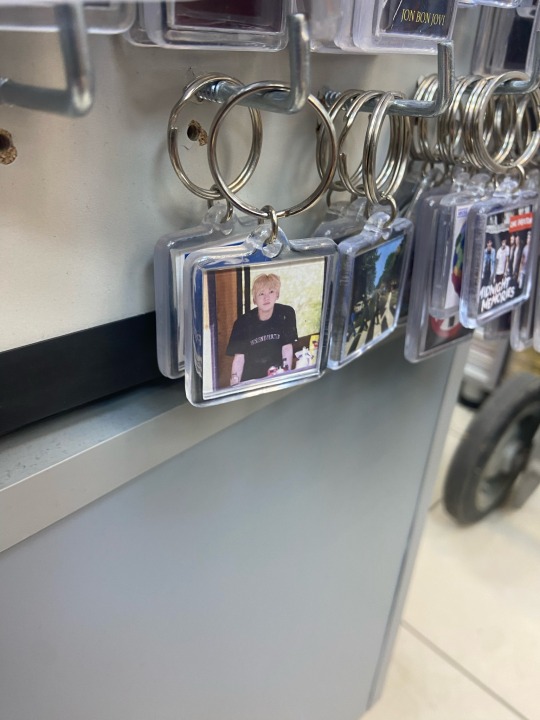
😭🥹🥹 PLEASEEEE macedonia yet again found as the funniest and best balkan country it’s true!!Seungkwan next to the beatles and 1D and he is eating them up i am afraid…. Thank you for reporting and thank you for thinking of me when you see silly things like these ily🥹💗💗💗
#and when i make macedonia 2024 trip not to visit my family but to meet kaya then what then what……#ask#fav
2 notes
·
View notes
Text
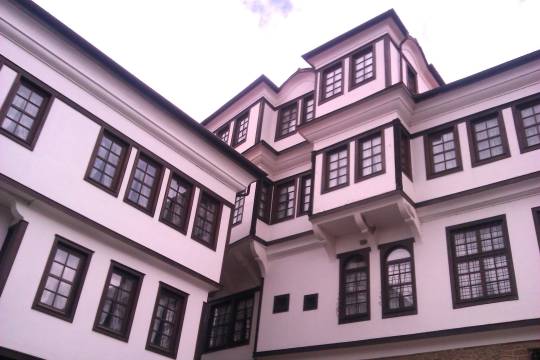
0 notes
Text
The TRNC Flag Flew In North Macedonia
#18th SKUPI International Folklore Festival#TRNC promotion#Visited North Macedonia#İskele Municipality Folk Dance Ensemble
0 notes
Photo

Alexander the Great: A Legacy of Conquest and Cultural Exchange
Early Life and Education
Alexander III of Macedon, known as Alexander the Great, was born on July 21, 356 BCE, and died on June 10 or 11, 323 BCE. He was the son of King Philip II, who built Macedonia into a major power in Europe. Alexander was tutored by Leonidas of Epirus and Aristotle, which instilled in him a lifelong love of reading, music, and resilience. He famously tamed the "untamable" horse Bucephalus at a young age.
Rise to Power and Conquest
Alexander became king at 20 after his father's assassination and embarked on a campaign to conquer the Persian Empire. He defeated King Darius III at Issus and Gaugamela, claiming Babylon, and proclaimed himself "King of Asia." Alexander's military genius and diplomatic skills allowed him to spread Greek culture across Asia Minor, Egypt, and India. He founded over 70 cities, including Alexandria in Egypt and Alexandria-Eschate on the Iaxartes River, to promote his vision as a "liberator" and god-king.
Expansion and Challenges
Alexander's campaigns included victories in Bactria, Sogdiana, and India. However, his troops mutinied in 326 BCE, forcing him to abandon further Indian conquests and leading him to march through the Gedrosian Desert. Upon his return, Alexander executed disobedient satraps and initiated cultural and military reforms, merging Macedonian and Persian units. This move was met with resistance, but he eventually appeased his troops.
Personal Life and Legacy
Alexander believed himself to be the son of Zeus, a belief influenced by his mother Olympias. His adoption of Persian customs and claims of divinity created tension among his Macedonian troops. Alexander suffered a significant loss when his friend and second-in-command, Hephaestion, died. His own death in Babylon at 32 led to a division of his empire among four generals: Cassander, Ptolemy, Antigonus, and Seleucus. Despite their struggles for power, they continued Alexander's policy of spreading Greek culture, ushering in the Hellenistic Period.
Alexander's legacy remains profound, influencing Western history and inspiring biographies that often portray him with a god-like status. While modern historians critique certain actions like the destruction of Persepolis, his achievements are still celebrated for their military genius and cultural impact. The empires founded by his successors, known as the Diadochi, continued his vision of integrating cultures until the rise of Rome.
Learn More
The above summary was generated by AI using Perplexity Sonar. To read the orginial human-authored article, please visit Alexander the Great.
41 notes
·
View notes
Note
Hey, how about an Alenoah! Princess and The Frog AU
Oh my god yes!
Naveen Alejandro, he's the prince of Malazuela (a portmanteau of Guatemala and Venezuela because the country Maldonia in the movie is a fictional country that is a portmanteau of the Maldives and North Macedonia. I wanted to try and incorporate Spain or even Mexico, but nothing sounded good. XD)
He and José (José is Lawrence somewhat in the way he travels with Alejandro and backstabs him (surprise, surprise) travel to New Orleans (or maybe Canada. Either would be fun!) because Alejandro is being forced to try and marry Lindsay. Yes, Lindsay is Miss Charlotte La Bouff. The reason was the alleged overindulgent spending Alejandro had done, which was actually José who framed the youngest Burromuerto.
Noah is, of course, Tiana. Except no mom there for support. Yeah, Mama Mudaliar is the one who passes away as their dad had already passed away, and it's him and all eight of his sisters trying to make it and support each other. Some are married but are still supporting their younger siblings, and Noah hates feeling like a burden, so he's trying to find success. I can see this as him wanting to open the restaurant because it was a family dream to own and work at a place with the whole family. All his mom ever wanted for her children was for them to be together and find happiness, and she joked that opening a family business was the way. Little Noah didn't pick up on the joking tone, so he's very serious about it.
Owen, I originally thought, could be Eli La Bouff (Big Daddy), but that would mean he's Izzy's dad, so that was an automatic no. The next best thing is him as Louis!
I don't know who Eva or Izzy would be, and I want them in there because I love Team E-Scope.
Ray kinda gives Ezekiel vibes, but I'm not too sure about that because I can totally see him being Cody, too. But also Izzy.
Similarly, I'm not sure who Madame Odie and Dr. Facilier could be.
Tyler is Travis, the guy dressed like a jester at the costume ball in the movie who wanted to dance with Charlotte. Lindsay isn't dismissed by him like Charlotte is in the movie. She shares that she promised to dance with the foreign prince for her dad so they could make a good impression. So she promises to dance with Tyler later despite knowing her dad is hoping a romance will happen between her and the visiting prince.
Alejandro genuinely believes Noah is a prince not just because of his costume but because of how beautiful he looks in the moonlight and the way he carried himself, so he is absolutely floored when it is revealed Noah is just a waiter. Gobsmacked. Befuddled.
They annoy the shit out of each other as frogs, but they start to open up about their problems. When Noah hears Alejandro's troubles with his brother José, Noah promises to expose José for being the big spender and also as the one to help in trapping and transforming Alejandro in exchange for money for his restaurant. Alejandro is very enthusiastic about his agreement.
Then he falls in love whoops.
This is such a fun idea to play around with! Maybe I'll explore it more later!
#total drama world tour#td alejandro#tdwt#alenoah#princess and the frog au#td izzy#td owen#td eva#td noah#td lindsay#td tyler#José is evil and deserves to be kicked in the kiwis#drama tot ask
32 notes
·
View notes
Note
Hi! I’m planning a trip to Greece but all I can find is info on the beaches and island hopping but I personally wanna go to see the mountains rather than do any partying stuff, the landscape and geology of Greece is fascinating and I’d like to see it up close but at the same time I want to be supporting local communities rather than major tourist corporations. Do you have any tips? Also if it’s helpful I am learning Greek so I don’t mind any recommendations for areas that are unlikely to have any English speakers! Thank you! 😊
Hello! I believe the official site of Greek Tourism Organisation "Visit Greece" has plenty of information about all places in Greece, not just the islands. Now, before getting to exactly what you asked, I would like to make some clarifications so you have a more accurate picture about Greece as a travel destination.
First, while the islands get the tourists by a long margin, it does not mean that they are all about partying. Only few islands are specifically partying destinations, namely just Mykonos and Ios, although even there you might be able to find regions which are more traditional and good for more chill, authentic and secluded vacations. Also, if staying far from mass tourism is very important to you, there are several islands that are not very known to tourists yet. Because they are islands, by nature some of them not yet touched by mass tourism and investments are actually very remote, more remote than many places in the mainland.
Second, Greece indeed has an interesting landscape and it has it both in the mainland and in the islands. While most islands have lower altitudes and less vegetation than the mainland, the vast majority has a very rugged terrain too. The type of "flatbread" landscapes, as I call them respectfully, virtually does not exist in Greece. Then four out of five active volcanoes in Greece are in the islands, which create interesting landscapes. And then there's Crete with its ultra mountain ranges. This is not me trying to sway you from your wish to go to the mainland, in fact I do think the mainland is severely underrated. I just want to give you a more spherical and accurate perception of Greece as a destination. So back to your ask!
I had trouble figuring out how to approach your ask. Asking me about seeing "the mountains" is in fact not easier than asking me about seeing "the islands". I thought about it long and hard (a bit too long, I hope you're still hanging around to see it) and based on your interests as described above I decided to offer four general plans about your itinerary. I called them "the plans of the triads". Every plan is a triad, I'll explain this in a bit.
Apologies in advance that I will go out on a limb and not include Thrace and include only a tiny bit of Macedonia in my plans. I did not include Thrace because even though it has the Rhodope mountains and perhaps the best or amongst the best woodlands, it is not as mountainous as the other regions. As for Macedonia, I include it only slightly and it's definitely a choice because literally the four biggest mountains in Greece are in Macedonia LOL including most of freaking Olympus. However, the reason I am leaving it out for the most part is because it is a slightly less mountainous region than the others, in the sense that there are larger intervals of hills and lowlands between the mountainous destinations for someone who tries to make a clever mountain itinerary, you know? So, you understood this correctly, I am leaving Olympus out of this lol. I will also leave out Mount Pelion of Thessaly, the most touristic Greek mountain, which is gorgeous, because I believe it's more cosmopolitan and not what you're asking for exactly. I had to preface this so one would not be weirded out by my exclusions, they are conscious choices.
So, I call the plans triads because all plans are based on visiting three geographic regions. These regions are all next to each other and they are all very mountainous so it would make it easier for you to explore in relatively close distances. By the way, you will need to rent a car for this or come by land with your own. You don't get to do a mountain itinerary in Greece with a bus or a train. Unless you get in touch with a travel agency but they will have some other itinerary in mind perhaps.
The triad plans are four:
The Screamer
The Recluse
The Athenian boy
The Mediterranean alternative
Here's a map with all plans:

The Screamer (Ioannina - Trikala - Grevena)
Why that name: I call this one the "screamer" because it is the most obvious choice perhaps for someone who wants mountains. It's not necessarily more mountainous than the others but it is the flagship of mountainous and landlocked mainland destinations in Greece.
Which major regions are featured: Epirus, Thessaly and Macedonia.
What's the X-factor: It has perhaps the ideal combo of "geology and landscape" out of the four as I am not only recommending mountains here but also the most famous natural wonder of the country and also a Record Guinness gorge.
Season: From middle spring to middle autumn, you don't want to get trapped there in a snowstorm.
Places you can hope to see in this plan ideally:
the UNESCO World Heritage Meteora Rocks and their medieval monasteries, as well as the scenic towns surrounding them
the National Park of Vikos-Aoos with its trademark Vikos gorge, the deepest gorge in the world in relation to its width
the National Park of Northern Pindus with the woodlands of Valia Calda
the quaint mountain villages of Elati, Pertouli and Neraidochori in Mount Koziakas, Trikala
the region of Zagori with its numerous UNESCO Cultural Landscape traditional villages
Mount Tymfi, also in Zagori, with its alpine lake
the northern part of Tzoumerka (Athamanian mountains) with villages such as Kalarrytes and Pramanta
the lake city of Ioannina, the 6th largest in Greece. If there, visit also the lake's island and its museum. It's the only place in Greece you can eat frog legs and lake eels, if for some reason you're up for this
the towns of Trikala and Grevena. Eat mushrooms if you visit the latter.
Metsovo, one of the largest mountain towns of the country. Visit the museums and eat cheeses and cured meats there.
Samarina on Mount Smolikas, one of the highest mountain villages in Greece and the Balkans. Smolikas is the second tallest mountain after Olympus but it has smooth slopes and it can be easily hiked.
IF you take the risk to go in winter, you can visit the Ski Resort of Vasilitsa in Grevena. Check if it's open / it has snowed enough first.
Remember, winter in Greece is either summer or Siberia, there's no in between and it's hard to predict which version you'll get.
Note! If you hike up to the alpine Dragon Lake of Mount Tymfi, DON'T swim in it even if it's summer. The lake hosts endangered endemic tritons and other fauna that is vulnerable to germs we might introduce to them.
Danger! If by any chance, you lose your way with the car in the mountains of Ioannina and Trikala, DON'T try a road named "Katara". It's a dangerous road. Keep driving in the highway.
Fun Fact: In this region, especially in Grevena, if you're very lucky, you might see bears. Greece's brown bears (almost?) never attack humans but of course keep your distance and observe from afar.
Will I be able to see all this in my journey: No, of course not. From now on, you'll have to make your internet search, check these places, find the ones you like best and ideally choose ones close to one another, check the distances, the accessibility, the average weather, the accommodations.
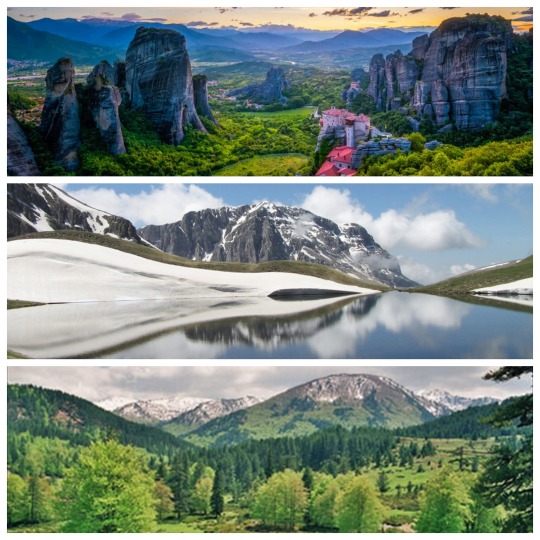
Meteora, the Dragon Lake of Mount Tymfi and Northern Pindus (probs Mount Smolikas). All these pics are clearly taken in spring, April or later.
The Recluse (Karditsa - Arta - Eurytania)
Why that name: From all the plans this is the one that is most likely to feel far from organized tourism and with the highest chances of meeting people not knowing English.
Which major regions are featured: Thessaly - Epirus - Sterea Hellas
What's the X-factor: It's a highly untouched and authentic feeling region with traditional pretty villages, imposing mountain scenery and several lakeside destinations, an ideal region to seek serenity and getting away from it all. At the same time, it has the most mountainous regional capital city in the country as well as high quality accommodation, including chalets.
Season: From middle spring to middle autumn, you don't want to get trapped there in a snowstorm, unless you have the means to spend the adverse weather in your accommodation, without worrying about being back on time.
Places you can hope to see in this plan ideally:
Agrafa mountains and their villages
the well known Plastira lake, it has organized tourist facilities
Karditsa town and its UNESCO protected public market
The region of Argithea in Karditsa with the small but beautiful Stefaniada lake
the central and southern part of Tzoumerka (Athamanian mountains), their villages such as Agnanta and Theodoriana, their woodlands and their waterfalls
The town of Arta with its fabled Bridge of Arta
Kremasta, the largest man-made lake in Greece
if you come in winter, the Ski Resort of Velouchi
Karpenisi, the mountainous capital of Eurytania
The natural wonder of Panta Vrechi Canyon. You 'll probably know that "Panta Vrechi" means "it's always raining".
the beautiful region of Prousos with the 12th century monastery and the canyon of the Black Cave
Will I be able to see all this in my journey: No, of course not. From now on, you'll have to make your internet search, check these places, find the ones you like best and ideally choose ones close to one another, check the distances, the accessibility, the average weather, the accommodations.

Agrafa mountains, the village of Agnanta in the Central Tzoumerka mountains and Proussos.
The Athenian Boy (Boeotia - Phocis - Phthiotis)
Why that name: Because it is the plan closest to Athens, in case you start your journey from there (most likely) or intend to visit Athens properly as well.
Which major regions are featured: We're putting Sterea Hellas in the spotlight with this one.
What's the X-factor: Again, its proximity to Athens without making any compromises in scenery. The mountains here are just as large as the ones in the plans above. Moreover, because it is close to Athens it has both secluded, remote destinations and more touristy, cosmopolitan or organized ones in close distance with each other.
Season: All year round because (broken record alert) due to its proximity to Athens perhaps things are catered to a little more carefully and it is less likely to stumble onto issues such as blocked roads even during adverse wintry weather.
Places you can hope to see in this plan ideally:
the cosmopolitan mountain town of Arachova
if in winter, the ski resort of Mount Parnassus
the city of Livadeia and its nearby Krya springs and waterfalls
the surrounded by mountains town of Amfissa and its elevated fortress, also some interesting carnival festival taking place there in February (earplugs recommended because these celebrations get loud)
the famous Oracle of Delphi, one of the most visited sites in Greece, on Mount Parnassus
the traditional villages of Phocis (scattered throughout the several mountains of the region)
Vardousia mountains, the mountains with some of the toughest peaks to climb across most of Greece
Mount Giona, the biggest mountain south of Olympus and the one with the biggest headwall in the Balkans
the gorgeous verdant region of Pavliani in Phthiotis
the National Woodland Park and the Asopos Gorge of Mount Oeta
if in Phthiotis, you can visit Thermopylae, the site of the battle between King Leonidas and his 300 Spartans with the Persians
Will I be able to see all this in my journey: Not if you want to explore each destination and mountain thoroughly. But it's possible that you can fit more things together in this one, although don't hold me to it, I may be wrong.
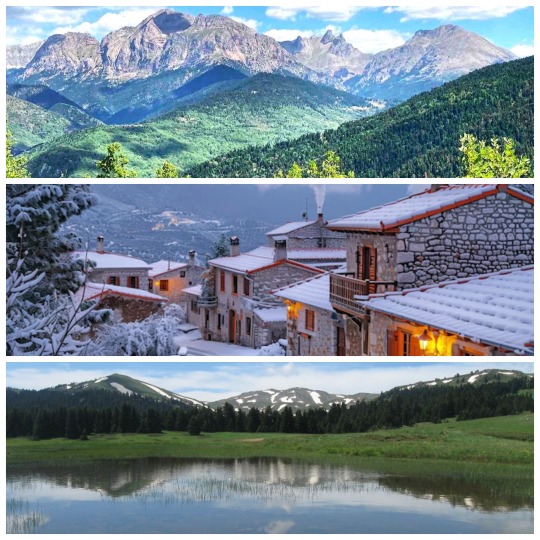
Vardousia Mountains, Arahova town and somewhere in Mount Oeta.
The Mediterranean alternative (Corinthia - Arcadia - Laconia)
Why that name: This plan trails down the mountainous core of the Peloponnese, South Greece. The climate is a little more typical Mediterranean than the previous temperate and alpine elevations. It still has large mountains which get snow in the winter but the weather is certainly a little milder. Furthermore, this plan includes a peninsula featured here for its special geomorphology and remoteness and not its altitude.
Which major regions are featured: Peloponnese through and through.
What's the X-factor: The milder weather, a more easily accessible combo of mountain and sea (although to be fair that's pretty easy in most Greek places) and a lot of historical and cultural sites.
Season: All year around. If however you definitely want wintry weather, ski resorts and snowcapped mountains, this happens of course but it is less guaranteed or it may last for a few days only.
Places you can hope to see in this plan ideally:
the Corinth Canal, Isthmus of Corinth
Mount Kyllini (or Ziria)
Aroania mountains (also known as Helmos) and the National Park of the Vouraikos gorge (okay most of it is in Achaea region next to Corinthia, I am stealing a little bit here)
Feneos and Doxa Lake
the historical quaint villages of Mount Menalo such as Stemnitsa, Dimitsana and Limbovisi
the town of Vytina, its nearby woods of Vytina and the Road of Love
if in winter and it has snowed, the ski resort in Mount Menalo
the very forested Mount Parnon and its villages
Mount Taygetus, the tallest mountain of the Peloponnese, overlooking the town of Sparta
the hilly Byzantine castle city of Mystras
Mani, a rough rugged - at places barren - remote peninsula with the tower houses of the Maniots, the fiercely proud and reserved people of the region. Places to see across Mani are Vathia, Areopoli, Oitylon and Cape Tenaro.
Will I be able to see all this in my journey: No but this plan is a little easier to navigate because you'll start from the north, heading from Athens to nearby Corinthia and then you can keep exploring as many of the aforementioned places as you want by going more and more south.
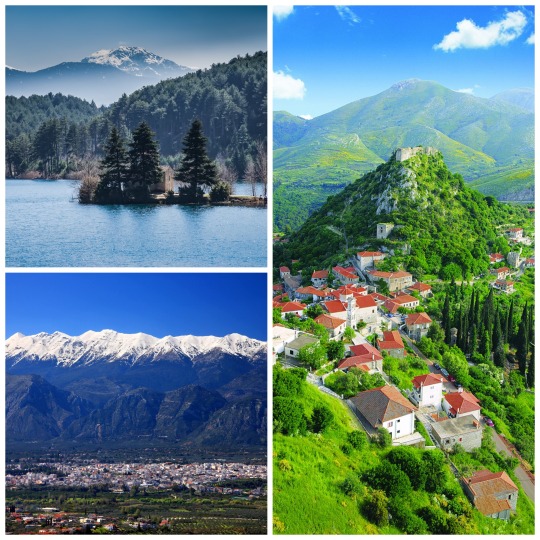
Lake Doxa in Feneos, a village in Mount Menalo of Arcadia and Mount Taygetus with Sparta on its foot.
Phew, okay that was it. I believe these are fairly good recs to examine and choose from. And again, to anyone that might wonder why I did not include this or that place, I know. I have left a lot of stuff out of this. But you gotta start somewhere. Anon, I hope this helps you out and also I hope you see this because it took me ages to finish it. In my defence, it was tricky!
Photos belong to their respective owners, I use them here as a visual guide for the Anon.
#greece#landscape#mountains#places#naturecore#travel#earth#travel guide#tourist guide#sterea hellas#epirus#thessaly#peloponnese#macedonia#ioannina#arta#trikala#karditsa#evrytania#boeotia#phocis#phthiotis#corinthia#arcadia#laconia#mainlandd#anon#ask#long post#long
22 notes
·
View notes
Text

WIP Wednesday
happy wednesday, everyone! hope you're having a good one! i'm currently in Manchester, visiting a friend and christmas shopping.
thanks for tagging me @that-disabled-princess!
i've already written this entire post once, but tumblr ate it. but i'm nothing if not stubborn.
as well as a snippet from my post-troy wip, you can find below a discussion of ancient greek periods and pregnancies, ancient anatolian food, and a painting.
so first of all, here's a snippet of Hermione, talking about periods:
"Is this not a conversation we should have in private?"
Deidamia laughed, loud as always, but not cruelly. "Oh, they don't mind! Pyrrhus grew up with six aunts and countless girl cousins, he's heard this all before."
I looked at Pyrrhus in surprise, and he shrugged in agreement, expression perplexed, like he didn't see why I was making a fuss about his presence.
"And him?" I jabbed a finger at Helenus.
"I had fifty sisters." He replied, lifting a cup to his lips to unsuccessfully obscure a smirk. Smug bastard. "And I find ginger tea helps more, but apparently that doesn't grow on this forsaken continent." He sighed wistfully. "Gods, I miss rice."
i've spent a lot of time researching ancient greek periods and their attitudes to them. i also spent an inordinately long time looking up alternative names for it, because "period" sounds very modern to me. i landed on menses. there's a surprising amount of discussion of them in this story, because Briseis and Andromache both have pregnancies in their chapters (Andromache has 5 sons and a step daughter, because everyone wants to be descended from Achilles through her. Alexander the Great claimed to be descended from her through his mother, and her grandsons supposedly colonised not only Epirus and Macedonia, but France and Britain too.)
i also had to research what foods ancient anatolia had that ancient greece didn't, for that last line. eventually the only thing i could see was that there is evidence that Troy traded with Asia for rice, while the Greeks knew about it, but didn't bother.
finally, since i'm in Manchester, i can feel this painting of Andromache in the art gallery calling to me. i've seen it three times and it never fails to take my breath away. it's huge in real life, you can really appreciate the details. i could stare at it all day.

in the Iliad, Andromache begs her husband, Hector, to be careful on the battlefield, as he is the last family she has left, and if he dies there will be nobody to protect her and their baby son, Astyanax. Hector agrees, sharing his fears that if he dies and Troy falls, she will be enslaved and taken to Greece. they tactfully don't mention what would happen to Astyanax, and instead share a sweet moment where he doesn't recognise his father in his helmet, and they laugh through their tears.
this painting is set after that. Hector has died in battle, Troy has fallen, Astyanax was murdered. Andromache is a slave in a foreign land, dressed in mourning black, sent to collect water. around her, life goes on, people bustling about, some stopping to look at her and gossip about the sad fate of the princess of Troy. Andromache ignores them all, standing still at the centre... her gaze fixed on a happy young couple with a baby, lost in their own world.
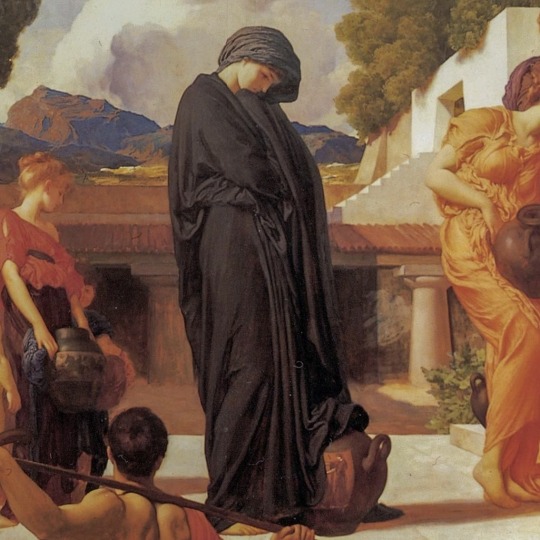
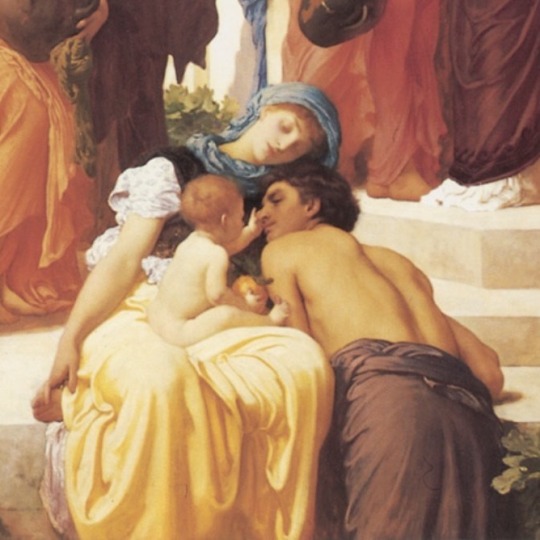
tags: @forabeatofadrum @cutestkilla @run-for-chamo-miles @roomwithanopenfire @prettygoododds @bookish-bogwitch @ic3-que3n @blackberrysummerblog @j-nipper-95 @youarenevertooold @larkral @orange-peony @aristocratic-otter @thewholelemon @alexalexinii @confused-bi-queer @shrekgogurt @comesitintheclover @raenestee @hushed-chorus @you-remind-me-of-the-babe @noblecorgi @shemakesmeforget @ileadacharmedlife @supercutedinosaurs @artsyunderstudy @otherpeoplesheartachept-2 and @ninemagicks
25 notes
·
View notes
Text



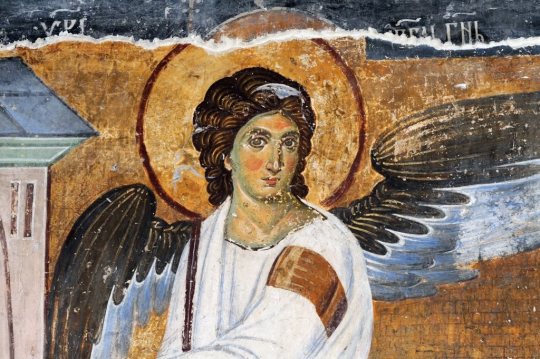



The Small One (Disney film) - Donkey Small One and Boy attend the birth of Jesus Christ in Bethlehem - Merry Belated Christmas (Julian Calendar) - Tribute to Don Bluth - Bible - Nativity - My Style
Although it is over, I wish everyone a happy Christmas, especially those who celebrate according to the old Julian calendar, which is celebrated on January 7. Although it sounds strange, in the country where I live, Christmas and New Year are already celebrated, since it is mostly celebrated according to the old Julian calendar (which is 14 days later than the Gregorian calendar), so Christmas is celebrated on January 7 and New Year on January 14 . And not only Serbia, but also other Orthodox countries that adhere to the old calendar, as is done in Montenegro, North Macedonia, Greece, Ukraine, Russia, Belarus, Georgia, Ethiopia and some other countries, celebrate those days (7th and 14th January).
Now I drew a drawing that is not related to my favorite ducks, but one of the reasons why we celebrate Christmas and how this holiday came to be in the first place. It is about the birth of Jesus Christ who was born in Bethlehem as the Savior who would save humanity from human sins, born of the Virgin Mary and is clearly described in the Gospels of Matthew and Luke. Yes, it is a little difficult to draw human characters, so I specifically drew the way the birth of Jesus Christ looks. Just a little different from the religious images represented, because this is related to one of my favorite underrated cartoons and Christmas specials ever, and it is about "The Small One" from 1978 and it can be said that this is the only aspect related to the Bible besides the Noah's Ark segments. It's about a little boy who tried to sell his favorite donkey called "The Small One" in Jerusalem, in Judea, unfortunately he didn't succeed, until in the end a man named Joseph came along who bought The Small One for one piece of silver and The Small One found his place. However, to make the ending better, I drew The Small One and Boy rejoicing at the birth of Jesus, and there is also Joseph who is guarding them. I also added an ox, as well as the archangel Gabriel who announced the birth of Jesus to his mother Mary, otherwise I drew him based on a fresco from the Mileševa Monastery in Serbia. Yes, the same archangel Gabriel will announce to the shepherds to visit the Savior who is staying in the manger. I drew everything together in my own style and sorry if it turned out a little bad. Small One was created by Don Bluth before he left Disney and is among his first animation works. By the way, Small One was made by Don Bluth before he left Disney and it's one of his first animation works. It's definitely worth a look, and here's where you can find it: https://www.youtube.com/watch?v=FTFK1yr4wpg
By the way, you can see a drawing I made related to the birth of Jesus Christ where he is visited by the Three Caballeros as the three wise men and their nephews as shepherds plus Angel Duck here: https://ducktoonsfanart.tumblr.com/post/740340917629796352/the-three-caballeros-as-the-three-wise-men-along
I hope you like this drawing and my style of drawing these people and feel free to like and reblog this (especially if you are a Christian), just don't copy my same ideas without mentioning me, thank you! And this is my gift to all Christians of good will. "Rejoice, for the Savior has come!"
Merry Christmas to everyone and a happy New Year! And if anyone asks, this is the real reason why we celebrate Christmas.
#my fanart#the small one#nativity#bible#jesus christ#traditional fanart#traditional art#artists on tumblr#birth of jesus#new testament#christianity#disney#don bluth#virgin mary#saint joseph#small one#archangel gabriel#fanart#religion#my artwork#my style#judea#palestine#syria#israel#literature#cartoons#comics#joseph#lamb
19 notes
·
View notes
Text
Good News From Israel
In the 23rd Mar 25 edition of Israel’s good news, the highlights include:
Hundreds of Syrian Druze visit Israel for the first time since 1948.
An Israeli discovery advances research into cures for genetic diseases.
Judea and Samaria leaders are welcomed in the UAE.
High school students launch Israel’s largest network of satellites.
Google’s $32 billion purchase of Wiz is the largest in Israeli history.
The Jewish festival of Purim was full of surprises.
Read More: Good News From Israel

Spring is in the air, as we approach the Jewish Spring festival of Passover (Pesach). As the Israeli clocks are about to "Spring forward", Israelis Spring into action to create a better world. Having deleted genes to eradicate cancer in the previous newsletter, this time Israeli scientists have found the mechanism that Springs the function of genes from "on" to "off". Another Israeli study finds what motivates Israelis to put a Spring in their step and start exercising. And Israeli medics and volunteers have once again Sprung into action to treat and assist victims of a major fire in Macedonia and floods in Argentina. In contrast to the ineffectual "Arab Spring", the "Israeli Spring" has changed the geopolitical landscape out of all recognition to what it was a year ago. Gaza, Lebanon, Syria, Iran and now Turkey are undergoing major upheavals. Israel has made a new alliance with the Druze of Syria, and Jewish leaders from Judea & Samaria just returned from a successful visit to the UAE. From the scientific efforts of Israeli teenagers has sprung Israel's first network of microsatellites. Watch how Israel redirected Spring rains and Spring water to irrigate the Negev desert. And it certainly has been "Spring fever" in the financial market with Google's purchase of Israel's Wiz for a record $32 billion. Finally, superheroes have been Springing from Israel's rooftops and Israeli politicians have been Springing surprises on the their opponents, each one delivering presents for the Jewish festival of Purim. The photo of Spring blossom in Israel is just up my street.
#Bibas#Birthright#chatbot#drones#Druze#Fetterman#Gal Gadot#Gaza#good news#Haredim#hostages#hydrogen#IDF#Israel#Jewish#Purim#satellites#Syria#UAE#Wiz
13 notes
·
View notes
Text
This will no doubt be tacky as hell, but the next time I’m in Macedonia I SO have to go and visit this. Not just as an ATG scholar, but a chick who grew up in Florida, theme park and tacky tourist capital of the US. It is my joy when traveling to find at least one tacky tourist shop to peruse and compare to those I grew up around. Ha.
How can the Florida girl resist an entire theme park devoted to Der Grosse One?
(With thanks to Christine for sending this to me, albeit the Greek Reporter version.)
36 notes
·
View notes
Text
youtube
The Millennium Cross, The tallest Cross in the world
#The Millennium Cross#adventure#travel#explore#mountains#mountain#macedonia#wanderlust#nature#city#photography#video#drone#sky#europe#balkan#bucketlist#place#place to visit#Youtube
5 notes
·
View notes
Text
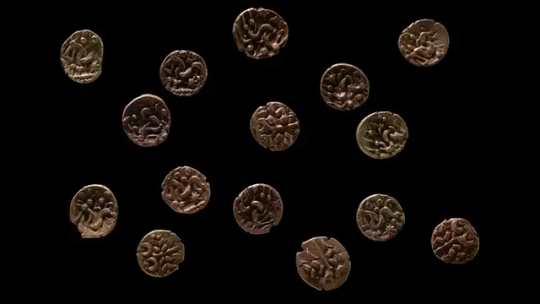
A 2,000-Year-old Iron Age Gold Treasure Found in Wales
Gold coins dating back more than 2,000 years have been found by metal detectorists in Wales, making them the first hoard of Iron Age gold coins to have been discovered in the country.
The 15 coins, which have been declared treasure, are known as staters. They were found the Welsh island of Anglesey, off the northwest coast of the country’s mainland.
Struck between 60 BC and 20 BC, the coins belonged to the Corieltavi tribe, who at the time inhabited the geographical area that is now England’s East Midlands, according to a National Museum Wales press release.
The precious metals were unearthed by three metal detectorists in a field between July 2021 and March 2022.
Lloyd Roberts, who said he has been a metal detectorist for more than 14 years, found the first coin.
“Finding a gold stater was always number one on my wish list,” he said in the release, adding: “That one coin alone would have made my year, but I went on to find another on my next signal.”
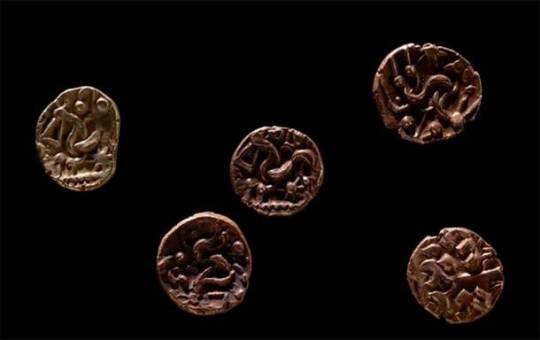
Roberts said that his friend, Peter Cockton, found the next three. They then contacted the Portable Antiquities Scheme, an organization which records such historical and archaeological finds.
Tim Watson, who said he only began metal detecting following encouragement from his father during lockdown, found the sixth.
“I rushed home to show my wife and we were both in awe of this coin, which was like nothing else I had found, immaculately preserved with such unusual stylised images,” Watson said in the release.
Watson said his enthusiasm led him to upgrade his metal detector and he found the remaining nine coins in the following weeks.
‘Rich archaeological landscape’
The gold coins’ elaborate design derives from those of Philip II, who ruled the ancient kingdom of Macedonia from 359 BC to 336 BC. The heads side of the coins shows the mythological deity Apollo’s wreath and hair, while the tails side shows a triangular-headed horse surrounded by symbols.
The coins were likely not used for everyday transactions, except potentially for some high-value purchases, according to the release. Instead, the staters are thought to have been used as gifts between the elites to secure alliances or show loyalty.
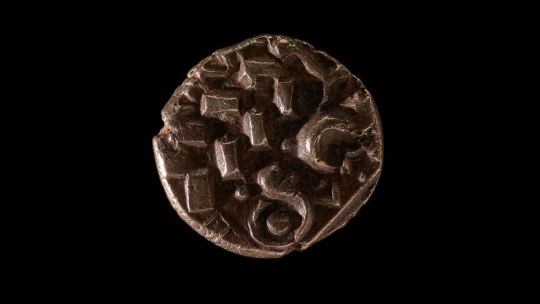
Another option is that the Corieltavi tribe used them to form part of an exchange for copper, which there were sources of in various parts of the island.
The staters could also have been used as “offerings to the gods” to fulfill a vow, according to National Museum Wales. Other archaeological finds from Anglesey, as well as Roman sources referring to the island that feature pagan priests, suggest the area was an important religious center at the time.
Gwynedd Archaeological Trust visited the site in September 2021 to see if there were any clues as to why the coins were buried there.
“This hoard is a fantastic example of the rich archaeological landscape that exists in North-West Wales,” said Sean Derby, Historic Environment Record archaeologist at Gwynedd Archaeological Trust. “While the immediate vicinity of the find did not yield any clues as to the find’s origin, the findspot lies in an area of known prehistoric and early Roman activity and helps increase our understanding of this region.”
Welsh museum Oriel Môn is looking to acquire the coins and put them on public display.
By Amarachi Orie.
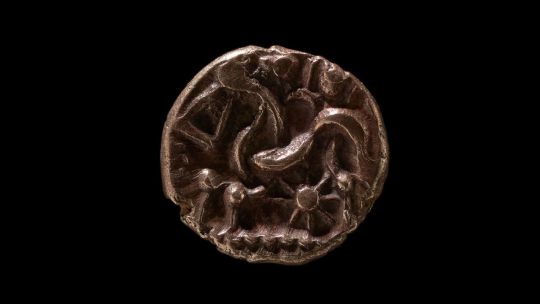
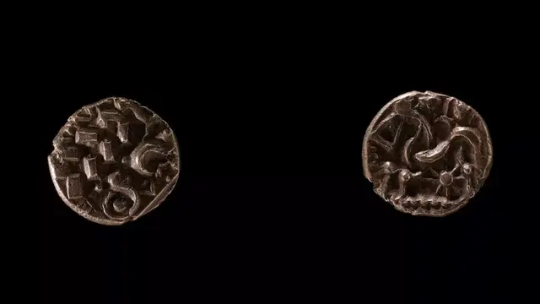

#A 2000-Year-old Iron Age Gold Treasure Found in Wales#gold#gold coins#collectable coins#treasure#metal detecting#ancient artifacts#archeology#archeolgst#history#history news#ancient history#ancient culture#ancient civilizations#the Corieltavi tribe
168 notes
·
View notes
Text
One Night in Palermo: Chapter 1
Hi, Everyone! I haven't done this in ages and I hope you'll all jump on board again for another story. It's 18 months after Sherlock jumped from Bart's and he's busily taking down Moriarty's web. He's also pining and worried for John, who thinks he's dead. Sherlock's trying to make his way to the Moran, the web's center, when another assassin comes on the scene. Find out what happens!
----------
One year to the day Sherlock leapt off Bart’s, his best friend watching in horror, found him creeping into a dank warehouse in the middle of Belgrade, Serbia. The dead detective had been all over the country in the last year, as well as those sharing its borders. Hungary and Romania, Bulgaria, North Macedonia, Croatia, Bosnia and Herzegovina, and Montenegro; all extensively traveled in the name of destroying Moriarty’s web of terrorists and murderers. He had just come through Kosovo from an assignment in Albania and tomorrow would take him to yet another location.
James Morairty may have died on the roof of Bart’s one year ago, but his criminal organization remained intact and Sherlock could not rest until Greg Lestrade, John Watson, and the beloved Martha Hudson were safe. Then maybe he could return to his old life of London and 221B and cases and John. Sherlock missed John most of all and had not been dead long before realizing the true extent of his feelings for his flatmate. Every moment not chasing down Moriarty’s criminals was spent wondering about John and what he was doing, or how he was doing. Worse yet, he dreamt of his flatmate as well, and they were becoming increasingly explicit in nature.
Sherlock gave a slight shake of his head to clear it. This was certainly not the time to go down that route of thinking. Mycroft’s intelligence indicated ten men in this building, making Sherlock’s full attention to the matter at hand imperative. The year’s assignments marked the longest period of time the detective had ever worked with his brother and there was at least another year to go before it would end. Remarkably, it had not been utterly intolerable as Sherlock had expected. Mycroft understood how Sherlock’s mind worked and gave him only the relevant information for each assignment. They met over virtual calls on a secured platform after each assignment was finished to discuss the next. Sherlock had needed serious medical attention on only two occasions and was immediately taken to a secret facility possessing everything required to address his injuries. The same short, blonde doctor cared for him each time, no doubt hand-selected by Mycroft to ensure Sherlock’s cooperation. The elder Holmes even made an appearance in both situations to make sure his baby brother was all right. He did not make himself tiresome either, much to Sherlock’s surprise, despite spending quite a lot of time by the detective’s side the second time around.
Sherlock had been caught during his last visit to Serbia. His captors quickly determined the usefulness of keeping him alive, but had no compunction with torturing him for the six weeks before his rescue. Mycroft even deigned to perform the extraction himself, he and his team infiltrating the base and killing every man in the bunker before carrying Sherlock out. It was at least a week before the detective could hold his eyes open for more than a few blurry moments at a time. When his senses and powers of deduction had returned, Sherlock was certain Mycroft had not left his side once. Oddly, the two brothers had grown closer as they worked together, but neither spoke of nor acknowledged it.
Having found no one in the warehouse thus far, Sherlock proceeded down a long hallway that led to a large meeting room. Intelligence supplied by Mycroft’s spies had shown it was where the ten men spent most of their time. A door at the left side of the room opened into an office used by a man named Markovič, the indisputable leader of this terrorist cell. He had worked closely with Moriarty on more than one occasion and murdered countless people around the world.
Two other doors entered the meeting room; one that opened to a hallway of small rooms wherein the men slept and the one Sherlock was steadily approaching. The ideal situation for Sherlock was finding all ten men in the meeting room. Slightly less ideal, was Markovič in his office and the other men in the meeting room. Some of them having a kip in their individual rooms was the least ideal, but this time of night typically saw them all together planning the events of the following day. Regardless, Sherlock was prepared for any eventuality, or so he thought.
Sherlock slowed his step as he approached the room’s half-open door, rendering his footfalls completely silent. While each of the ten men was a very skilled killer, all were also dim-witted. Even Markovič, though intelligent, was no more than slightly above average. Sherlock knew his appearance would be surprising, but once the first few shots were fired, he would have to act quickly to avoid retaliation. A scant few feet from the door, Sherlock angled his body for the best view of its occupants and what he saw boggled his mind.
Eight men lay sprawled on the floor, face down on the table, or slumped back in chairs. All of them were covered with blood still oozing from pin-point bullet holes in chests, throats, or heads. None of these men had a chance to do more than consider reaching for their own weapons before they dropped. Sherlock analyzed the scene and deduced the events as they had happened while he moved through the room to Markovič’s office.
The door was also ajar. Sherlock pushed it open slowly, already knowing what he would find. Markovič was sat at his desk, leaning back unnaturally in the chair. His eyes were wide open and unseeing as they stared blankly at the ceiling. A hole was perfectly placed in his forehead, creating an isosceles triangle with his eyes. Blood stained his face where it ran down his nose and cheeks, over his throat to soak his shirt. Significant spatter and gray matter decorated the wall behind him in a sickly red glow.
Without delay, Sherlock went to the third door in the meeting room to check bedrooms for the final missing man. Finding him was not difficult. The first door in the hall was the only one open, so Sherlock let himself in cautiously. He found the man on the floor in a pool of blood, bedsheets twisted around one leg, and a pistol held loosely in one hand. He had obviously been only halfway out of bed when the door was kicked open and fired one shot quickly, the evidence of which marred the door frame next to Sherlock’s left shoulder. The intruder had not done more than twitch his head slightly to the side before expertly placing a bullet in the man’s forehead and watching him drop.
*****
Hours later, Sherlock sat at a desk in a safe house across the border in Hungary. He had changed into jeans and a plain t-shirt in dark green. His eyes were fixed on the screen of a laptop as he waited for his brother to accept the call. When the connection was made, it was Anthea’s face that appeared instead of Mycroft’s.
“Sherlock,” she greeted him. She looked tired. Perhaps the last year had weighed heavily on her shoulders as well. “He wasn’t expecting you for another hour.”
“Nor was I,” Sherlock replied dryly. “The assignment did not go as anticipated.”
“But you’re alright? It’s done?” Anthea asked with a touch of concern in her voice. The two of them had become far better acquainted over the course of Sherlock’s assignments and now had a certain rapport.
“Unconditionally,” Sherlock answered and watched as the subtle creases at the corners of her eyes smoothed away, only for them to return when he asked, “how is John?”
Anthea opened her mouth to reply, but Mycroft entered the room before she said a word. He moved to the screen swiftly and sat, studying Sherlock’s face. He was wearing his usual three-piece suit minus the jacket, and his sleeves were rolled up. A haggard expression dominated his features, but a sense of overall relief washed over them at seeing Sherlock in one piece. Mycroft let the indifference that hid whatever modicum of emotion he had slide into place and sat ramrod straight, his typical persona fully recovered.
“You were able to complete the mission,” Mycroft said with only the hint of a question in his tone.
“In a matter of speaking, yes,” Sherlock replied vaguely.
Mycroft cocked an elegant brow and leaned in.
“What do you mean?” He asked with keen interest.
“I found the bodies of all ten men upon entering the warehouse,” Sherlock said simply.
“An opposing faction?” Mycroft speculated, sounding unconvinced.
“No,” Sherlock said flatly, “it was precise and clean. None of the torture and delay seen between these enemies. A single man walked in quietly, just as I did, and murdered them all with one shot each.
“He killed all eight men as he moved through the room, three before they could rise from the table. Markovič was in his office and posed no challenge to dispatch. The last was in a bedroom.”
Mycroft had narrowed his eyes while Sherlock spoke, considering each word carefully. When the detective finished, his brother raised his gaze to regard him in silent contemplation.
“The work of an assassin where there should only be one,” Mycroft muttered.
“Indeed,” Sherlock agreed, “and it had occurred within the hour.”
Mycroft caught Sherlock’s eye and considered him carefully.
“Sherlock,” his tone took on a condescending characteristic that always made the younger roll his eyes, “while the situation is unusual, it is not out of the realm of possibility.”
“Oh, please,” Sherlock began, but Mycroft cut him off quickly.
“You have a mission that cannot be delayed by a… mystery, no matter how intriguing,” Mycroft said snidely. “Need I remind you of its particular importance to you, brother mine?”
Sherlock closed his mouth with a snap and pressed his lips into a thin line. Closer though they may be, Sherlock hated his brother for consistently adopting this air of superiority at a perceived weakness.
“Fine,” Sherlock spat, “but you will find out who it was. If I’m known to this assassin, I want to know his every movement. I will not tolerate interference.”
“Of course, Sherlock,” Mycroft assured him smugly. “I will use every resource at my disposal.”
****
As confident as Mycroft had been, his channels found out nothing about the assassin in the coming weeks. No one was able to determine where the man came from or where he got his information. One thing became abundantly clear, however. He also seemed to be dismantling Moriarty’s criminal organization one piece at a time.
Sherlock completed two assignments over three weeks before encountering the assassin again. The circumstances were much the same as the first time. The target called Romania home and spent most of his time terrorizing every community within a fifty mile radius. He had assisted Moriarty several times over the last decade and had often welcomed the man into his home. If James Moriarty ever had anything even vaguely approaching a friend in his adult life, it would be this man.
Sherlock watched silently from the shadows as his target entered a small room and closed the door, leaving his guard outside in the dimly lit hall. They were inside a massage parlor not far from the man’s home. He spent four nights a week in this place, making rather dubious visits to a certain masseuse. Fortunately for Sherlock, the man’s guard made similar visits to the owner of the shop.
A quiet whistle echoed through the hall twenty minutes after Sherlock’s target entered the masseuse’s room. He watched as the guard looked right, then left, and then disappeared down the hall. Sherlock waited another five minutes to be sure the guard would not return before moving silently toward the door his target had entered. He stood next to it for a moment, his back to the wall, already knowing it was unlocked. He had spent the last seven days watching his target and tracking his movements. Sherlock knew every habit and routine in the man’s life, right down to leaving the door unlocked while he got a massage and a blow job so he could exit quickly if one of his enemies interrupted.
All Sherlock needed to do was open the door and pull the trigger. He had become quite a good markman over the last year and his gun was equipped with a silencer. He wouldn’t miss and no one would hear a thing. The only thing that made him hesitate was the masseuse. He had not yet decided what to do about her. He could kill her along with the target to prevent anyone being alerted by her screams, which were certain to follow her lover’s untimely demise. He could find some quick way to render her unconscious while she and the target were distracted. He could simply shoot his target and run, risking a successful escape. Sherlock was likely to be tortured if caught, a situation he could not afford. He scowled, the words ‘a bit not good’ echoing through his mind. The only option was knocking out the masseuse and hoping no one noticed him before he did it.
Sherlock looked up and down the hall, just as the guard had, and then moved to face the door. He twisted the knob silently with his left hand and pushed it open. The scene before him was nothing like he expected. Instead of finding the two of them fucking on the massage table, the woman was lying on the floor, unconscious and fully clothed. The target was clearly dead on the table, a bullet hole in his temple. Spatter decorated the wall next to the table and Sherlock could hear the quiet drip of blood as it fell from the headrest to the floor. Curious, he entered the room and squatted cautiously next to the woman. He might have risked touching her to find a pulse, but could see it clearly enough on her neck. The assassin had left her alive.
Sherlock’s gaze darted around the room until it came to rest on a small window near the top of the back wall, the only outside wall in the room. It opened on a hinge, a glass pane that lifted up and it was ajar. Several telltale scuffs left by opening and closing it marred the bottom of the pane. The assassin’s entrance and exit point.
Sherlock narrowed his eyes and stood. The guard would not return for another ten minutes, but the detective could not afford to be seen by anyone. He walked swiftly out the door and closed it behind him, looking up and down the hall again. Seeing no one, but hearing faint footsteps, he crept into the shadows to wait. Sherlock heard a faraway door open and the footsteps fade away slowly. After a few minutes of silence, he left the building and made his way to the next safe house.
A few hours later and a good two hundred miles away from the massage parlor, Sherlock stood in front of a laptop set in the small bedroom of a cozy flat. He had just relayed an account of the evening’s events to his elder brother and moved on to deductions made about the assassin. Mycroft’s less-than-enthusiastic response was quickly grating on Sherlock’s nerves.
“He has a conscience,” Sherlock argued vehemently. “He could have simply killed the woman, but chose not to.”
His brother’s unimpressed face looked back at him from the laptop screen, thoroughly unconvinced. Sherlock wished, just for a moment, that they were in the same room so he could grab Mycroft’s lapels and shake him.
“Very informative, brother mine, but I fail to see how it will help to find this mysterious assassin,” Mycroft intoned dismissively, glancing at his perfectly manicured nails.
“Finding him, no, but it goes a long way in determining what kind of man he is,” Sherlock sneered. “He is not a heartless killer and that tells us quite a bit.”
“Oh, very well,” Mycroft conceded impatiently. “He may not immediately put a bullet in your head should you meet, but will introduce himself first.”
Sherlock sighed loudly and rolled his eyes.
“I will take care of him,” Mycroft continued sternly and it rankled Sherlock. The tone was the same used to scold him as a child. “You concentrate on your assignments and put an end to this dreadful business so you can return to your precious doctor.”
“How is John?” Sherlock found himself saying. It wasn’t what he meant to say, but Mycroft’s words squeezed his chest so completely that saying anything else would have stopped his heart entirely. He hadn’t even been thinking about John and was blindsided by the rush of sentiment, though he tried to keep that hidden. Mycroft, for his part, looked very disconcerted at the slip. His frustration had gotten the better of him, something that happened far more often than he would like to admit since he and Sherlock began “this dreadful business”.
“Sherlock,” he said with a long suffering sigh.
“Don’t patronize me, Mycroft,” Sherlock snapped. “Just tell me what I want to know.”
“He is…unaltered,” Mycroft replied carefully.
“Unaltered?” Sherlock repeated through clenched teeth.
“I said unwell the last time you asked,” Mycroft straightened his spine and looked down his nose at his brother. “You have not returned to Baker Street. Do you imagine he is any different?”
Sherlock glared at his brother, blood boiling, but said nothing. He didn’t trust himself to speak. He knew his brother wanted to infuriate him. It was a distraction. Mycroft did not want to answer questions about John. It was nothing unusual, but affected Sherlock differently this time. Sherlock suddenly felt exhausted and homesick. Every bit of energy left his body. He was sick for John and if his brother didn’t want to talk about John, Sherlock had no desire to pry. He was not prepared to hear that the doctor had teetered ever closer to a crumbling precipice that might give way at any time.
“Fuck off, Mycroft,” Sherlock snarled. He shut the laptop forcefully just as his brother closed his eyes in disdain at the vulgar choice of words.
Sherlock paced furiously. He was restless and frustrated and frightened out of his mind. Dozens of storylines played out in his mind as he took each step. The most disturbing thought ended with John’s broken body on the pavement at Bart’s, the same place they had both been just over a year ago, and it made Sherlock’s heart stutter in his chest. He gasped at the pain and stumbled into the loo to be sick. He splashed water on his face once he could stand again without retching and tried to calm himself, but his chest only felt tighter. He buried his head in his hands and prayed to whatever deity would listen that John Watson be alright.
When Sherlock raised his head again, his movements were stilted and his face remote. He cleaned his teeth and changed into pajamas mechanically, getting into bed and turning out the lights. Staring into the darkness, he parted his lips and breathed slowly. If he didn’t let his thoughts out of his mind, didn’t give them life, his brain and heart would surely burst from his body.
“Wait for me, John,” he whispered into the darkness. “Please.”
****
The next time Sherlock ran into the assassin, the circumstances were quite different. It was three assignments from the last and in Montenegro. The target had not been difficult to finish, but her brother had spotted Sherlock as he made his escape and set off after him. They ran through the compound, ducking this way and that. Every corner the detective turned should have put more distance between the two, but the man behind only grew closer. Sherlock was getting tired and he knew it. On impulse, he ducked into a stairwell and barely tripped as he flew down the steps. He quickly pushed open the heavy wooden door he found there and hurried into an open courtyard full of towering shrubs and fountains. The moon shone brightly, dazzling stars surrounding it, lighting a path of escape. Unfortunately, the man following Sherlock was too close not to make a move for him.
The man dove for the detective and caught him around the waist with his arms. They went down hard, but Sherlock rolled swiftly and struck out at his attacker. They exchanged a few blows before strong hands wrapped around the detective’s throat. Without hesitation, he slid his own arms in-between his attacker’s and wrenched them outward. The other man’s elbows bent, giving Sherlock the leverage to pull his hands away and ram their foreheads together.
At first, only the other man was dazed, so Sherlock shoved him to the side and hopped to his feet. However, the after-effects caught up with him after one or two steps. Suddenly, his head swam and his sense of balance failed completely. Tumbling to his knees, Sherlock tried desperately not to fall any further. He gasped for breath and felt incredibly hot, but resisted the urge to tear the mask from his face. He preferred assignments that did not require a mask, ones where he could maintain a safe distance from targets and their associates. On this particular occasion, his passage through the compound could find him face to face with anyone and he could not be recognized.
Sherlock took a few deep breaths until his vision began to clear. Getting to his feet, he glanced around to check that his attacker had not similarly recovered. He saw nothing as rough hands grabbed his right arm and twisted it behind his back. A cold knife blade touched his throat before he could make any move to free himself. He was trapped. His mind raced, analyzing his options and discarding them; all the while, the blade pressed into his throat, breaking the skin ever so slightly. He nearly jolted at the sound of hoarse laughter in his ear.
“You thought you would get away?” The man holding Sherlock steady chuckled loudly. He pulled the blade more tightly and the detective winced. “You killed my sister, you son of a bitch.”
A gasp filled Sherlock’s lungs, but not for fear of his life as his attacker assumed. It was what he saw in the dark window in one of the tall buildings that lined the courtyard. A sight Sherlock never would have seen, if not for a glint of metal in the moonlight. As soon as he saw that flash of light, his eyes made out the figure of a man with a gun. Standing in the tall window was the assassin, covered in black from head to toe. His face and hair were covered with the usual balaclava. Any other details were lost to the darkness of his clothes and surroundings. His gun was aimed and ready, if the location of the reflection Sherlock had seen was anything to go by.
Sherlock stood very still, not even listening to the rants and threats from the man holding a knife to his throat. One way or another, Sherlock was going to die tonight. If the idiot behind him didn’t do it soon, he would be robbed of the pleasure by the assassin, who would certainly shoot them both. Sherlock could get away from only one of them, not both. He kept his eyes on the assassin as time ticked by and wondered why he hadn’t pulled the trigger twice already. The man couldn’t be weighing his options. It was simple: Aim and fire.
Just as Sherlock thought the word “fire”, a bright flash of light appeared from the assassin’s weapon and Sherlock felt a whoosh of air on his cheek. He expected pain or instant oblivion and got neither. The air around him was suddenly quiet and his mind registered his attacker’s hands going lax. The knife tumbled to the brick floor as the man leaned heavily against the detective’s back. Going down slowly, Sherlock maneuvered the man onto his back and looked at his face. There, between his unseeing eyes, was a perfectly placed bullet hole.
Sherlock’s head shot up to the window to see the assassin, but the man was gone. The pane held nothing but darkness. Without a second thought, the detective gathered himself and stood. It wouldn’t be long before his target’s body was discovered and the compound filled with people who would be happy to kill him. He crept through the courtyard and silently made his way out, encountering no one as he went.
Hours later, ensconced in one of Mycroft’s safe houses, Sherlock booted up the waiting laptop and entered his credentials. His mind was awash with deductions and questions and theories. If nothing else, the evening confirmed the standing deduction that the assassin had a strong moral compass. Quite a bit of additional data had been revealed as well, but Sherlock had not yet sorted through it. He needed to spend some time in his mind palace, arranging the pieces.
The laptop screen caught his eye when his brother’s face came into view. Sherlock had hoped to speak with Anthea first, but had no such luck. He leaned forward and placed his hands on either side of the keyboard, a posture he often adopted when speaking to his brother.
“The assassin was there,” Sherlock stated without preamble. “I beat him to the mark, but he was there.”
“And you know this because?” Mycroft asked with an arched brow.
“I had a knife to my throat and he shot the man holding it,” Sherlock replied without hesitation.
Mycroft’s eyes widened and he leaned in closer to his own laptop.
“He saw you?” He probed with an edge to his voice.
“Not as such. I was wearing a mask. My whole head was covered,” Sherlock answered evenly. “There was nothing to give me away. I was merely a man in distress.”
He could see his brother relax a fraction and then noticed that his eyes were locked on the small bandage Sherlock had fitted to his own neck. The detective furrowed his brow and shook his head dismissively.
“It’s fine,” he told Mycroft in a dull tone. “Superficial. I’ll be able to go without the bandage in the morning.”
“Good,” Mycroft approved, looking more at ease. “That is to say, I am glad you are safe. I must admit, however, I am somewhat troubled by the assassin’s actions. Surely killing you both would have been more to his advantage.”
“Precisely,” Sherlock replied with satisfaction. “It would’ve been easier as well; hitting my attacker with pinpoint accuracy to ensure his demise before he cut my throat requires much more skill than shooting us both. It proves my point.”
“That the assassin has a conscience,” Mycroft supplied in a long-suffering tone. He sighed. “Sherlock, you are a romantic.”
“I most certainly am not!” Sherlock objected, his good mood quashed in the blink of an eye. “I have merely analyzed the data and reached the logical conclusion, as I have in countless other situations.”
He glared at his brother, who returned the look with a smug smile on his face. Sherlock didn’t feel the need to continue the conversation because his pig-headed brother would not relent. He never had before and would not start now. Growing weary of him, Sherlock rolled his eyes.
“Tell me about the next assignment,” he demanded, wanting nothing more than to move the call along so he could retreat to his mind palace.
“Yes, of course. Let’s get down to business, shall we?” Mycroft smirked and began debriefing Sherlock on the next target, The detective both listened and imagined how best to have revenge upon his return to London.
****
The following assignment was easily completed in as much as it was finished before Sherlock even arrived. Four days after Montenegro, the detective stealthily entered a caravan dealership that was closed for the day. His target and a small band of men in his employ had taken refuge there, believing no one would find them. After entering the dealership, Sherlock followed music lilting through the air until he reached an extra-long caravan, knowing what he would find before reaching it. While the music played loudly, the absence of all other noise led him to one inevitable conclusion: The assassin had been faster this time.
Five of the six men Sherlock expected lay dead in the caravan’s central room. It occupied more or less the entire vehicle, housing a kitchenette along one side, a narrow couch and table on the other. Two seats and the steering column filled the front of the room, windscreen before them. A small loo cut into the back of the room with closets opposite. In between the two was a narrow hallway that led to a bedroom. Judging by the positions of the men and the angles of the bullets that killed them, the assassin had come from the hallway. He must have climbed in a bedroom window and used the element of surprise.
Sherlock moved cautiously into the bedroom, expecting to find the body of the sixth man, but the room was empty. It was also a mess. A lengthy struggle had clearly taken place in the cramped room and Sherlock could read it all in the broken and overturned furniture. The upper hand had shifted a few times throughout the fight. A stray shot was fired once, twice, and then Sherlock’s eyes came to rest on a piece of bloody glass lying on the floor near a cabinet on the far side of the room. He went to it in three long strides. It was part of a broken mirror that had been affixed to the wall above a waist-height cabinet. One of the two men had grabbed hold of it and stabbed the other, but which was which? Sherlock’s eyes tracked their movements through drips and smears of blood. The injured man eventually broke free and tumbled out the room’s only open window. The other man must have followed because the caravan door would have been left open had he used it.
Gun still at the ready, Sherlock hurried out the door and around to the back of the caravan. He walked silently along the trail of blood and shoe prints. More and more of the sticky, red substance stained the concrete as he went. There wasn’t enough to indicate that the injured man was bleeding out, but was still a troubling amount. Sherlock quickened his pace, anxious to learn which man was injured. He found himself hoping it was not the assassin. It made little sense, but he felt some odd camaraderie with the man. They did seem to have the same goal and were inextricably linked by it.
Sherlock wove his way through the parking lot, around one caravan and another, until he turned a corner and stopped dead. Twenty feet ahead of him, next to a chain link fence, was the body of a man. He was on his back and was obviously dead. Sherlock’s throat went dry and he quickened his pace. He and the assassin had narrowly missed one another for almost three months. They didn’t know the other’s identity and hadn’t even been in the same room together, but had come to expect one another. At least, Sherlock had. He supposed the same might not be true of the assassin, but he liked to think it was, especially after Montenegro. The man had blatantly made the decision not only to save, but also spare Sherlock’s life and the resulting sentiment had softened his heart toward the man. The detective would have considered these feelings a weakness in the past. Now, he saw it in a completely different light. The assassin gave him something familiar to look for, to count on. He couldn’t have John or home, but could at least have something, though it paled in comparison.
Sherlock was jogging by the time he reached the dead man. He couldn’t see his head properly until he stood right next to him. Once he did, Sherlock breathed a sigh of relief. The man before him was not wearing a mask of any kind, nor was there one near the body. Instead, he matched the description of one of the six men Sherlock was sent to kill. The assassin had escaped.
Relief quickly turned to trepidation, however, as he got a better look at the dead man. He had no stab wounds on his body and looked to have been killed by blunt-force trauma. Sherlock’s eyes darted around the scene, picking out a heavy metal bar and more blood. He followed a trail of it with his eyes for a short distance. It led to, and passed through, an old opening in the chain link fence. Something had weakened the links and broken through long ago. The assassin must have used it to sneak inside or he would not have known to use it as an escape. Sherlock looked as far beyond the fence as he could see, but saw no body and no large pools of blood. It seemed the assassin had escaped, indeed. But how far had he gotten and how badly was he injured?
When he recounted the night’s events later for Mycroft, Sherlock left out the possible extent of the assassin’s injuries and hid his concern for the man. He knew precious little about the man. It made no sense for Sherlock to feel at all connected to him and yet, here he was. He couldn’t stop himself from viewing the connection as a separate but united force against what was left of Moriarty. As such, not knowing the assassin’s fate unsettled Sherlock in a way he couldn’t explain and he hoped their paths would cross again soon.
****
The next assignment was long and tedious. Sherlock spent nearly three weeks just garnering enough trust through various acts of theft and bullying as assigned by the target’s second in command to even be told the target’s location. He then spent another six days planning out how to neutralize successfully. His frustration grew day by day at having to waste an entire month on this one target, lengthening his time away from John. John, who he knew was struggling. His last few conversations with Anthea were vague at best, but informative enough to know that John’s grief had renewed.
The knowledge slowed Sherlock’s progress with the assignment and he knew it. He couldn’t bring himself to care. He would rather know at least something about John and be distracted than know nothing at all. He dreamt of his friend every night again; comforting him and assuring John he would be home again. He awoke each morning with renewed vigor at having spent the time with John, even if only in his mind. Part of him hoped dreams did the same for John, but they more likely only discouraged him. Sherlock had the advantage of knowing they would meet again, whereas he was dead in John’s world. Sherlock tried to ignore the regret and guilt that ate at him for it.
Motivated by the desire to end his exile and return home to John, Sherlock lost his patience and brought the assignment to an abrupt end. While in the target’s bunker for a debriefing, Sherlock broke into his office and waited. Nearly two hours later, the man and his second opened the door. Sherlock greeted them politely with one bullet each and left as fast as he could.
His work done, after the agonizingly long month, Sherlock wanted nothing more than to move on to the next assignment. He grimaced as he logged onto the secure server he and Mycroft used to communicate, knowing his brother would berate him for his slowness. Maybe Sherlock would get lucky and Anthea would debrief him. He hoped as he pushed enter and waited, then sighed when Mycroft’s smug face came into view.
“Mycroft,” Sherlock murmured in greeting, saying nothing else. Mycroft more than made up for it.
“Good evening, Sherlock. I am glad to see you have finally finished your assignment. I was beginning to think that your target had persuaded you to stay on,” Mycroft’s snide words pushed Sherlock over the edge. The last thread tethering his frustration over the assignment snapped and he nearly swept the laptop off the table.
“Fuck off, Mycroft!” Sherlock shouted. “You know this is not how I wanted it to go. Just tell me about the next assignment and go back to your cake. I wouldn’t want to keep you from your greatest pleasure.”
“Sherlock, has it really come to this?” Mycroft began with an epic eye roll.
“You started it!” Sherlock interrupted. “Just tell me what I want to know.”
“In due time, brother mine,” Mycroft dismissed Sherlock’s anger out of course, “I have come into some information about your mythical assassin.”
“Oh, yes, perfect. Just what I want to know,” Sherlock snarked back, crossing his arms. “Tell me, Mycroft, how many assignments has he completed while I’ve been stuck on just one?”
“On the contrary,” Mycroft said blandly. “It seems both of you have succeeded in doing nothing. I have no indication he has made any movements during the last forty-two days.”
It was then that Sherlock remembered the trail of blood he had followed so long ago and the strange sense of loneliness he had felt. He had mentioned neither to Mycroft after that assignment.
“He was injured,” Sherlock stated almost without thinking, “in that caravan dealership in Skopje. I followed a trail of blood. He must need time to recover.”
“You failed to mention that in the debriefing,” Mycroft answered, his tone rife with skepticism.
“It was not relevant,” Sherlock replied haughtily.
“Wasn’t it?” Mycroft speculated. “Hm. I wonder.”
“Is there a point to this, Mycroft?” Sherlock snapped, growing tired of the conversation. His brother had a certain knack for analyzing his motives at the most inconvenient times.
“Could it have been a more serious injury, brother mine?” Mycroft continued calmly, unfazed by his baby brother’s outburst. “We have no evidence of him at all in the time between today and that night. Could he have been neutralized?”
“Neutral- he’s not our enemy, Mycroft,” Sherlock countered. “He saved my life.”
“Because doing so suited his purpose,” Mycroft supplied, condescension slipping into his tone. “You are very obviously on a path similar to his own. Why would he want that assistance to end?”
Mycroft was right. It was only logical for the assassin to keep Sherlock alive so the man didn’t have to hit every target himself. The detective had allowed sentiment to color his views of the assassin and if Mycroft didn’t know before, he certainly did now. Damn him.
“No,” Sherlock gave a slight shake of his head after a moment of thought, “there wasn’t enough blood for the injury to have been life-threatening. He will appear again. Just give him time.”
Mycroft pressed his lips into a thin line and took a deep breath through his nose. He had more to say, but obviously debated on whether to do it now or save it. Sherlock knew Mycroft had chosen not to wait the moment his lips parted.
“You will have to deal with him one day,” Mycroft said carefully. “The time will come when you are no longer useful to him.”
Sherlock fought not to roll his eyes. As if he hadn’t considered that particular inevitability already.
“I will handle that when the time comes, not before,” Sherlock said flatly.
****
As if on cue, Sherlock found his next target in a private train compartment with a bullet in his head. They were on a train in Hungary. The man’s two most trusted associates were at his side, also shot dead. The assassin was back.
The corner of Sherlock’s mouth curled as he stood in the compartment’s doorway. He gave a subtle salute to the scene, closed the door, and casually walked back to his own compartment. As he went, he was filled with a sense of satisfaction and hope. With his own efforts coupled with those of the assassin, his timetable would change for the better and he could return home to John earlier than expected. Mycroft may have been right about an eventual confrontation between Sherlock and the assassin, but until then they would each enjoy the other’s usefulness without question.
****
Another handful of assignments came and went, Sherlock and the assassin working in tandem, but never encountering one another. Shortly after leaving another scene in which the assassin beat him to the mark, Sherlock calculated their joint progress once again and found that their current rate would see him back in London a full four months early. He was delighted.
A particularly successful month for both of them resulted in another revision of the time required. They had shaved off a few more weeks, much to Sherlock’s satisfaction. That was how, at eighteen months post-Fall, Sherlock found himself in Palermo, Sicily with only two targets remaining before he could return home to London and his life.
------
I know it was a long one, but I hope you enjoyed it. Thank you so much for reading and for all your support! I've missed you all so much! Tune in next week for chapter 2 and remember, keep your stick on the ice. We're all in this together.
Love, Jane
43 notes
·
View notes
Text
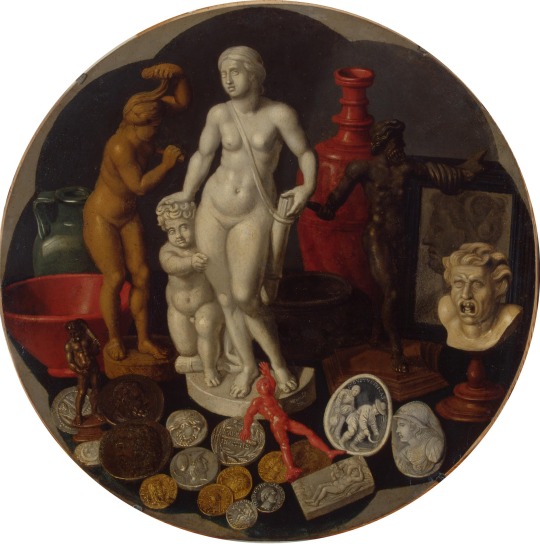
Hendrik van der Borcht, the Elder, 1583-1660
[Diana] Still Life with a collection of curiosities, n/d, oil on copperplate, 34.5x34.5 cm
The State Hermitage Museum, Inv. GE-2445
This still life reflects the antiquarian interests of van der Borcht, who organized sales of just the kinds of collections of curiosities seen here. Van der Borcht had visited Italy, where he studied painting and collected carved gems and medals. In the foreground we see a carved shell, The Reapers (now in the Hermitage collection), a French work of the first half of the 16th century, symbolizing the month of August and forming part of a series of The Seasons. In the centre is a marble statue of Diana, while the marble to the right is probably Jupiter. Amongst the coins we can identify a denarius of Otto, a 2nd-century BC tetradrachma from Macedonia, a drachma or tetradrachma with a depiction of Athena, a dedication denarius of Faustin I with the sickle moon and seven stars, a denarius of Hadrian and a Hesse-Thuringian bracteate of the 12th century. (Hermitage)
51 notes
·
View notes